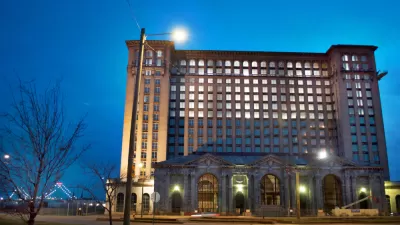In search of cheap rent and an urban experience with some bona fide street cred, young people are making the move out to the Rust Belt, Will Doig reports.
Facing economic challenges of historic proportions, some youngsters are leading the move back to the old manufacturing powerhouses of the Midwest. Young people (anywhere between 18- and 34-years-old) have been bucking the trend of decline in Rust Belt cities from Cleveland to Pittsburgh, from St. Louis to Detroit.
Part of the shift, of course, has to do with affordability – in 2009, the median price of a home in Detroit was $7,500 – but for many, it has just as much to do with the edgy image of urban decay.
"I think there's a backlash in the American psyche that's longing for
that," says Cleveland native Richey Piiparinen. "Look at Miami. We've
learned that all that glitters isn't gold."
But Doig warns that "Rust Belt Chic," as Piiparinen calls it, must be taken with a dose of realism: it's "at least partly a romantic fantasy, and that makes
it a risky way to try to revitalize. Last year, Guernica magazine ran a
withering critique of what it called 'Detroitism,'
the fetish for crumbling urban landscapes mixed with eccentric utopian
delusions, 'where bohemians from expensive coastal cities can have the
$100 house and community garden of their dreams.' What these dreams
seldom include, however, are the almost unimaginable systemic problems
many of these cities suffer from: failed schools, violent crime, the
threat of municipal bankruptcy."
FULL STORY: Rust Belt chic: Declining Midwest cities make a comeback

Maui's Vacation Rental Debate Turns Ugly
Verbal attacks, misinformation campaigns and fistfights plague a high-stakes debate to convert thousands of vacation rentals into long-term housing.

Planetizen Federal Action Tracker
A weekly monitor of how Trump’s orders and actions are impacting planners and planning in America.

San Francisco Suspends Traffic Calming Amidst Record Deaths
Citing “a challenging fiscal landscape,” the city will cease the program on the heels of 42 traffic deaths, including 24 pedestrians.

Study: Anti-Homelessness Laws Don’t Work
Research shows that punitive measures that criminalized unhoused people don’t help reduce homelessness.

In U.S., Urban Gondolas Face Uphill Battle
Cities in Latin America and Europe have embraced aerial transitways — AKA gondolas — as sustainable, convenient urban transport, especially in tricky geographies. American cities have yet to catch up.

Detroit Says Problems With Property Tax Assessments are Fixed. Advocates Disagree.
With higher-valued properties under assessed and lower-valued properties over assessed, advocates say there's still a problem with Detroit's property tax system.
Urban Design for Planners 1: Software Tools
This six-course series explores essential urban design concepts using open source software and equips planners with the tools they need to participate fully in the urban design process.
Planning for Universal Design
Learn the tools for implementing Universal Design in planning regulations.
Heyer Gruel & Associates PA
JM Goldson LLC
Custer County Colorado
City of Camden Redevelopment Agency
City of Astoria
Transportation Research & Education Center (TREC) at Portland State University
Jefferson Parish Government
Camden Redevelopment Agency
City of Claremont




























